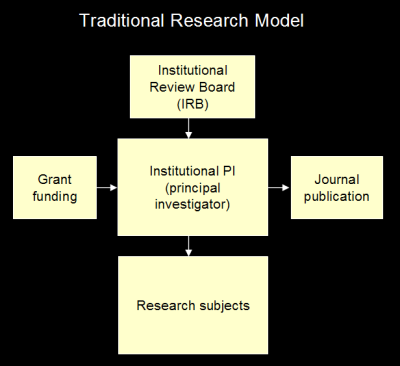 It is clear that quantified self-tracking, preventive medicine, and community-based research conducted by citizen scientists could be a huge new industry. The coming era of very large data sets and continuously collected information with algorithmic tools for signal-to-noise interpretation could significantly shift how the baseline measures of health are defined and managed. Citizen science is re-innovating the model for conducting science at every level.
It is clear that quantified self-tracking, preventive medicine, and community-based research conducted by citizen scientists could be a huge new industry. The coming era of very large data sets and continuously collected information with algorithmic tools for signal-to-noise interpretation could significantly shift how the baseline measures of health are defined and managed. Citizen science is re-innovating the model for conducting science at every level.
In the traditional research model (Figure 1), there is a principal investigator at an institution, conducting research on subjects, under the purview of an Institutional Review Board, supported by grant funding and publishing results in journals.

The citizen science model (Figure 2) is different as there is no distinction between investigator and subject, everyone is an investigator and participant; therefore the analog to the IRB is different, perhaps there are citizen ethicists, or a list of FAQs. Funding could come from patient advocacy groups, innovative research foundations, social venture capital, and crowd-sourcing; and research results could be self-published on the web.
(source: DIYgenomics - an open platform for citizen science research)











 Email me
Email me Twitter
Twitter MS Futures Group
MS Futures Group Data Visualization Wiki
Data Visualization Wiki Economic Fallacies
Economic Fallacies
